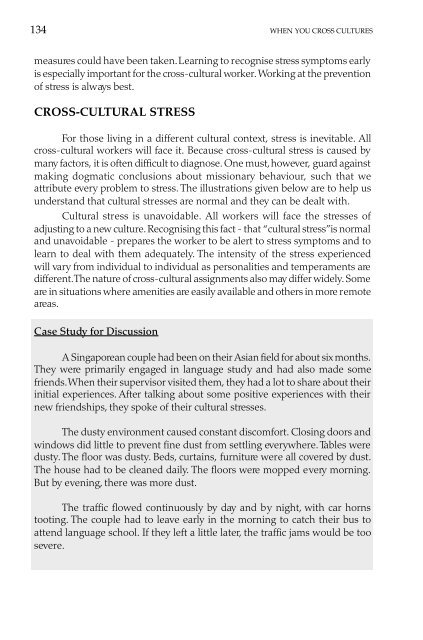WHEN YOU CROSS CULTURES - World Evangelical Alliance
WHEN YOU CROSS CULTURES - World Evangelical Alliance
WHEN YOU CROSS CULTURES - World Evangelical Alliance
Create successful ePaper yourself
Turn your PDF publications into a flip-book with our unique Google optimized e-Paper software.
134 <strong>WHEN</strong> <strong>YOU</strong> <strong>CROSS</strong> <strong>CULTURES</strong><br />
measures could have been taken. Learning to recognise stress symptoms early<br />
is especially important for the cross-cultural worker. Working at the prevention<br />
of stress is always best.<br />
<strong>CROSS</strong>-CULTURAL STRESS<br />
For those living in a different cultural context, stress is inevitable. All<br />
cross-cultural workers will face it. Because cross-cultural stress is caused by<br />
many factors, it is often difficult to diagnose. One must, however, guard against<br />
making dogmatic conclusions about missionary behaviour, such that we<br />
attribute every problem to stress. The illustrations given below are to help us<br />
understand that cultural stresses are normal and they can be dealt with.<br />
Cultural stress is unavoidable. All workers will face the stresses of<br />
adjusting to a new culture. Recognising this fact - that “cultural stress” is normal<br />
and unavoidable - prepares the worker to be alert to stress symptoms and to<br />
learn to deal with them adequately. The intensity of the stress experienced<br />
will vary from individual to individual as personalities and temperaments are<br />
different. The nature of cross-cultural assignments also may differ widely. Some<br />
are in situations where amenities are easily available and others in more remote<br />
areas.<br />
Case Study for Discussion<br />
A Singaporean couple had been on their Asian field for about six months.<br />
They were primarily engaged in language study and had also made some<br />
friends. When their supervisor visited them, they had a lot to share about their<br />
initial experiences. After talking about some positive experiences with their<br />
new friendships, they spoke of their cultural stresses.<br />
The dusty environment caused constant discomfort. Closing doors and<br />
windows did little to prevent fine dust from settling everywhere. Tables were<br />
dusty. The floor was dusty. Beds, curtains, furniture were all covered by dust.<br />
The house had to be cleaned daily. The floors were mopped every morning.<br />
But by evening, there was more dust.<br />
The traffic flowed continuously by day and by night, with car horns<br />
tooting. The couple had to leave early in the morning to catch their bus to<br />
attend language school. If they left a little later, the traffic jams would be too<br />
severe.

















